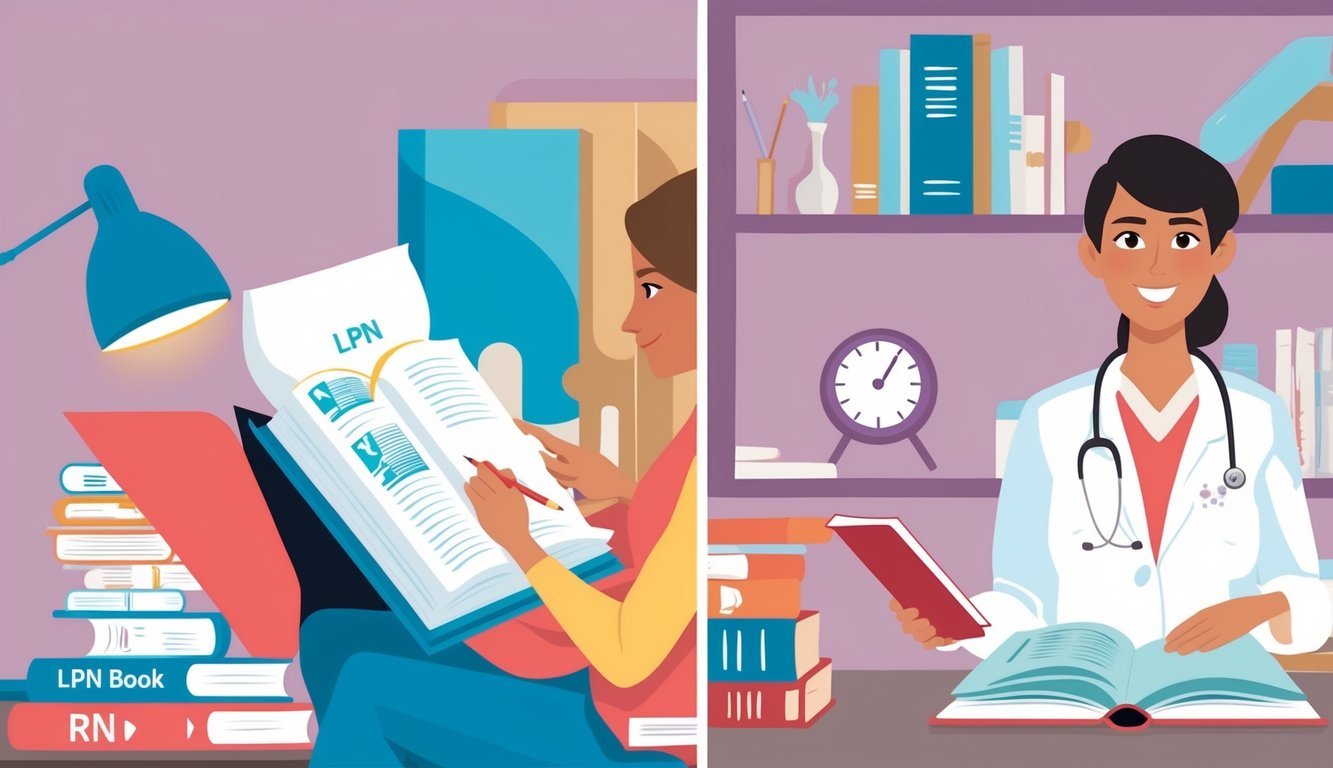Transitioning from a Licensed Practical Nurse (LPN) to a Registered Nurse (RN) can enhance your career and earning potential.
The process typically takes about one to two years, depending on the program you choose and your previous experience.
Many LPNs opt for bridge programs that offer a streamlined path to RN certification, allowing you to build on your existing knowledge and skills.
In this article, you will explore the various options available for advancing your nursing career.
You will learn about different programs, the application process, and what to expect in terms of coursework and clinical experience.
Understanding these aspects can help you make informed decisions on your journey to becoming an RN.
Using your current qualifications, the right program can not only fast-track your education but also open up new job opportunities in the nursing field.
Let’s dive into the details to help you successfully navigate the transition from LPN to RN.
Key Takeaways
- The transition from LPN to RN generally requires one to two years of education.
- Several bridge programs are available to help you advance your nursing career.
- Becoming an RN can lead to improved job prospects and higher salaries.
Exploring the Path from LPN to RN
Transitioning from an LPN to an RN can enhance your nursing career and expand your job opportunities.
Understanding the available options and programs is crucial for making an informed decision.
Understanding LPN to RN Bridge Programs
LPN to RN bridge programs are designed for licensed practical nurses who want to become registered nurses.
These programs typically require you to meet specific admission criteria, such as having a high school diploma or GED and a valid LPN license.
Most programs offer a blend of online and in-person classes, allowing flexibility.
They cover essential nursing concepts and clinical skills.
The duration of these programs can vary but often takes 1-2 years depending on your course load and pace.
For detailed options, check this guide.
Comparing LPN to ADN and LPN to BSN Options
When considering advancing your nursing education, you can choose between LPN to ADN (Associate Degree in Nursing) and LPN to BSN (Bachelor of Science in Nursing) programs.
LPN to ADN programs typically take around 1-2 years.
They focus on foundational nursing care and prepare you for the NCLEX-RN exam.
LPN to BSN programs generally take 3-4 years and include more comprehensive nursing education, often integrating leadership and management training.
Each pathway leads to an RN license, but consider your career goals and timeline before choosing.
Research schools such as Saint Martin’s University for LPN to BSN options here.
Admission Requirements and Application Process
When transitioning from a Licensed Practical Nurse (LPN) to a Registered Nurse (RN), understanding the admission requirements and application process is crucial.
This section outlines what you need to know about prerequisites, the application steps, and options for receiving credit.
Prerequisites and Eligibility Criteria
Before applying to an LPN to RN bridge program, you must meet specific prerequisites.
Typically, programs require a valid LPN license, a minimum GPA (often around 2.5 or higher), and completion of foundational courses.
These foundational courses may include subjects like Anatomy, Physiology, and Psychology.
You may also need to submit a standardized test score, such as the TEAS (Test of Essential Academic Skills), depending on the program.
Completing a background check and providing immunization records may be required.
Review individual programs to ensure you meet all specific requirements.
The Application and Selection Process
The application process for LPN to RN programs generally involves multiple steps.
First, you’ll complete an online or paper application.
This usually includes submitting transcripts, proof of your LPN license, and any other required documents.
Next, you might need to undergo an interview as part of the selection process.
Some programs have a competitive admission process, so highlighting your experiences and skills is vital.
Be prepared to demonstrate your commitment to nursing, as this can enhance your chances.
Make sure to check the deadlines for application submissions.
Late applications are rarely accepted, which may hinder your progress toward becoming an RN.
Credit by Exam and Transfer Credits
If you have completed relevant coursework as an LPN, you may be eligible for credit by exam or transfer credits.
Many programs allow you to earn credit for previous nursing courses through examinations like the Challenge Exam or NCLEX-PN.
Additionally, if you’ve taken similar courses at accredited institutions, you can often transfer those credits.
It’s essential to check with the admissions department about which courses are eligible for transfer.
Preparing documentation like syllabi can streamline this process.
For more information, you can refer to resources like Texas County Technical College and Nurse.org.
Curriculum and Clinical Experience

In an LPN to RN program, the curriculum is designed to enhance your skills and knowledge.
You will explore both theoretical concepts and practical applications that are crucial for nursing.
Clinical experience is a vital component, giving you hands-on training in real healthcare settings.
Core Nursing Curriculum Components
The nursing curriculum includes several essential components.
You will study nursing theory, which lays the foundation for understanding patient care.
Key subjects often include:
- Anatomy and Physiology: Understanding the human body and its systems.
- Pharmacology: Learning about medications and their effects on patients.
- Nursing Skills: Developing practical skills for patient assessment and care.
- Psychosocial Nursing: Focusing on mental health and emotional support.
Many programs also integrate topics like ethics in nursing and leadership skills.
The goal is to prepare you for the diverse challenges you will face in your nursing career.
Programs often structure courses to build on what you learned as an LPN while introducing advanced concepts.
Importance of Clinical Rotations in Nursing Education
The nursing curriculum also includes clinical rotations, which are critical for your development as a nurse.
They provide hands-on experience in various healthcare environments, such as hospitals and clinics.
During these rotations, you will:
- Apply nursing theory in real-world situations.
- Work alongside RNs and other healthcare professionals.
- Learn to handle different patient needs and conditions.
Rotations build your confidence and skills in areas like patient interaction, documentation, and critical thinking.
Many programs require a minimum number of clinical hours to ensure you gain ample practice.
This experience is invaluable as it prepares you for your future role in nursing.
You can find more about the required hours for various programs at Nurse.org.
Licensing, Accreditation, and Educational Outcomes

In your journey from LPN to RN, understanding the licensing requirements and the importance of accreditation is crucial.
These factors significantly affect your educational outcomes and your path to becoming a registered nurse.
Preparing for the NCLEX-RN Exam
After completing your RN program, you must pass the NCLEX-RN exam to obtain your RN licensure.
This exam tests your knowledge and skills necessary for safe and effective nursing practice.
To prepare effectively, consider the following steps:
- Study Resources: Use review books, online courses, and practice tests tailored for the NCLEX-RN.
- TEAS Exam: Some programs require the TEAS exam as part of the admission process. A good score can strengthen your application.
- Study Groups: Join or form study groups to share knowledge and resources.
Many graduates find success by starting their preparation early and using diverse study materials.
Utilize resources from the NCSBN for official information on the NCLEX-RN.
Understanding the Role of Accreditation
Accreditation ensures that your nursing program meets specific educational standards.
Attending an accredited institution is vital for your future career.
Key accrediting bodies include:
- Commission on Collegiate Nursing Education (CCNE)
- Accreditation Commission for Education in Nursing (ACEN)
Benefits of an accredited program include:
- Quality Education: Accredited programs follow guidelines that promote a high standard of education.
- Eligibility for Licensure: Many states require graduation from an accredited program to take the NCLEX-RN.
- Financial Aid: Federal financial aid is usually available only to students in accredited programs.
Understanding the significance of these accreditations can guide you in selecting the right program and ensuring a quality education.
Career Advancement and Employment Opportunities
Transitioning from an LPN to an RN opens up various pathways for career growth and enhances your earning potential.
As you progress in your nursing career, several opportunities will arise in different healthcare settings that can lead to both professional and financial benefits.
RN Salary and Job Outlook
Registered nurses earn a higher salary compared to LPNs.
According to the U.S. Bureau of Labor Statistics, the median annual salary for RNs was approximately $81,220 as of May 2022, while LPNs earned around $54,620.
This difference highlights the financial incentives of advancing your nursing career.
The job outlook for registered nurses is also promising.
Employment for RNs is projected to grow by 6% from 2021 to 2031, which is faster than the average for all occupations.
With an increasing focus on patient care and a growing elderly population, the demand for healthcare services is expected to rise.
Opportunities for Advancement in Nursing
Becoming an RN not only improves your salary but also provides various opportunities for advancement in nursing.
You can move into specialized areas such as:
- Nurse Educator
- Clinical Nurse Specialist
- Nurse Manager
Healthcare facilities often look for RNs with specialized training for these roles.
Acquiring certifications in areas like critical care or pediatrics can also enhance your qualifications.
In addition to specialization, RNs may pursue leadership roles in case management or administration.
These positions often allow you to have a significant impact on patient care while increasing your responsibilities and salary.
Frequently Asked Questions

In this section, you will find answers to common queries regarding the transition from LPN to RN.
These questions address program duration, online options, curriculum differences, and clinical requirements.
What are the typical duration options for LPN to RN bridge programs?
LPN to RN bridge programs usually take between 12 to 24 months to complete.
The exact duration depends on whether you choose a full-time or part-time schedule.
Some programs offer accelerated options for quicker completion.
Can I complete an LPN to RN transition online, and if so, what are the timeframes?
Many LPN to RN programs offer online options.
The timeframes for these programs can vary.
They typically range from 12 to 18 months for full-time students.
You should check specific program details to understand their schedules.
What is the fastest path to transition from LPN to RN?
The fastest path to transition is often through an accelerated LPN to RN bridge program.
These programs are designed for quick completion, usually within 12 months, but may require a heavier course load.
What distinguishes the curriculum intensity between LPN and RN programs?
The curriculum for RN programs is generally more intense than that of LPN programs.
RN programs cover advanced topics such as pharmacology, complex patient care, and leadership roles.
They require a deeper understanding of nursing concepts.
Are there LPN to RN bridge programs available that can be completed in a year or less?
Yes, there are LPN to RN bridge programs that can be completed in a year or less.
These programs often require full-time attendance.
They may involve an accelerated curriculum designed for committed students.
Do LPN to RN programs require in-person clinical hours, and how are they typically scheduled?
Most LPN to RN programs require in-person clinical hours to provide hands-on experience.
These hours are usually scheduled during weekdays or weekends, depending on the program’s format and availability.
Make sure to check the specific scheduling of the program you are interested in.

